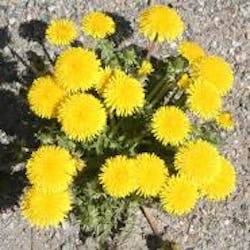“Dandelions have the potential to serve as a great natural alternative to synthetic rubber in our products.” –Angela Harris, research engineer, Ford Motor Co.
First we hear about using recycled carpet fibers to make engine cylinder head covers. Now full-scale testing of vehicle interior materials made from weeds – specifically, dandelions and guayule, a shrub common in the southwestern U.S. – is making the news.
Pretty soon, if this keeps up, we might see vehicle engineers sporting garden gloves and pruning shears along with their laptops and CAD/CAM systems.
“We're always looking for new sustainable materials to use in our vehicles that have a smaller carbon footprint to produce and can be grown locally,” noted Angela Harris, a research engineer with Ford Motor Co. "Synthetic rubber is not a sustainable resource, so we want to minimize its use in our vehicles when possible. Dandelions have the potential to serve as a great natural alternative to synthetic rubber in our products.”
As a result, Ford is working with The Ohio State University’s Agricultural Research and Development Center (OARDC) to see if a milky white substance that seeps from the roots of Russian dandelions (known as Taraxacum kok-saghyz or “TKS”) can be used to produce rubber-like product. ORDAC is also doing similar work with guayule.
Ford’s Harris said the OEM could potentially use these weed-based substances as a plastics modifier, to help improve the impact strength of plastics. The material might then be used in places such as cup holders, floor mats and interior trim.
Before the dandelion-derived rubber can be put to use, Ford researchers will assess the initial quality of the material to evaluate how it will perform in a variety of plastics that are used in vehicles and to ensure it meets durability standards.
“It’s strange to see weeds being grown in perfectly manicured rows in a greenhouse, but these dandelions could be the next sustainable material in our vehicles,” she added.
The neat thing is, this is but one of several projects examining whether different kinds of organic and/or recycled products can be used as part of vehicles large and small. Ford is also experimenting soy foam seat cushions, wheat straw-filled plastic, recycled resins for underbody systems, recycled yarns on seat covers and natural-fiber plastic for interior components.
I tell you one thing – it will be a neat day (if a slightly weird one) to see dandelions harvested and sent to vehicle component manufacturing facilities alongside shipments of steel, aluminum, and other raw materials.
